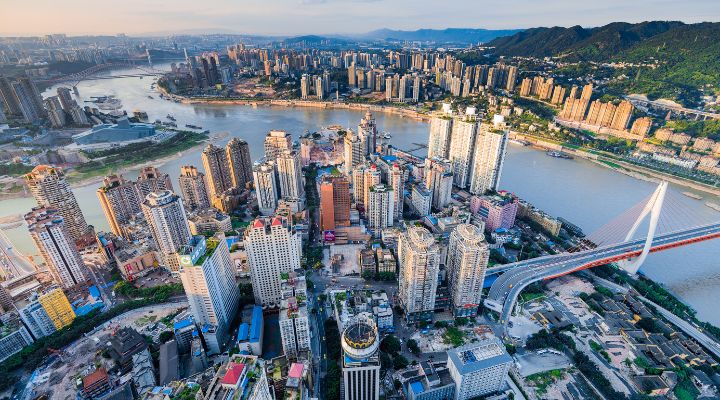China's mobility revolution (and why everyone else should take notice!)
Over the last 20 years, and particularly the last 10, China has been at the forefront of what has been nothing short of a mobility revolution.
Driven by rapid urbanization, unprecedented scale and groundbreaking technological advancements, the world's second-most populous country's mobility developments have had and will continue to have far-reaching implications that extend beyond its land borders. Understanding these developments and their significance is crucial for policymakers, businesses and individuals worldwide.
China’s rapid ascent up the global transportation innovation league table has not been without its controversies, however. In the last couple of weeks, the Biden Administration has just announced that it’s blocked entry into the US for Chinese electric vehicles (EVs), a move that caused President Xi to express ‘grave concerns’; and the EU has also sounded a warning about Europe’s over-reliance on China to supply ‘legacy’ microchips.
China is currently experiencing one of the largest and fastest urbanization processes in human history. Hundreds of millions of people have migrated from rural areas to cities in search of better opportunities, leading to the emergence of megacities and the expansion of urban areas

Urbanization on the Rise
Putting all that to one side, China is currently experiencing one of the largest and fastest urbanization processes in human history. Hundreds of millions of people have migrated from rural areas to cities in search of better opportunities, leading to the emergence of megacities and the expansion of urban areas. This rapid urbanization has placed immense pressure on existing transportation infrastructure, resulting in congested roads, overcrowded public transportation systems, and increased pollution.
To address these challenges, China has invested heavily (a contender for understatement of 2024) in innovative urban mobility solutions. From the construction of extensive subway networks to the deployment of electric buses and the promotion of bike-sharing programmes, China is constantly seeking new and exciting ways to improve its transportation efficiency, reduce congestion and therefore subsequently enhance the quality of urban life. Talking of electric buses, the rapidly expanding Chinese automaker BYD is close to a deal that would see it supply a fleet of all-electric double decker buses in London.
China is constantly seeking new and exciting ways to improve its transportation efficiency, reduce congestion and therefore subsequently enhance the quality of urban life
Transport giant Go-Ahead Group is set to award the Shenzhen-based firm a contract to build more than 100 e-buses at around €470,000 each, some €115,000 per vehicle cheaper than its UK competitors.
Scale of Economy
China's sheer size and scale make its mobility developments particularly noteworthy. With its vast land area and diverse population, the country presents a unique testing ground for new transportation technologies and business models. What works in China has the potential to be scaled up and replicated in other parts of the world, making it a fairly accurate bellwether for global mobility trends.
Moreover, China's massive domestic market has attracted both domestic and international companies that are eager to capitalize on the growing demand for mobility solutions. Companies such as Didi Chuxing, which started solely as a ride-hailing service in China, have become global players, expanding their operations to other countries and shaping the future of urban transportation worldwide. EV manufacturer BYD Auto Co also have to be considered a major player in the field, selling a reported 3.02 million vehicles in 2023, a seven-fold increase on 2020 (although 2020 is something of an outlier in the global statistics game).
BYD are the world's largest plug-in hybrid electric vehicle manufacturer and the second-largest battery electric vehicle manufacturer, after Tesla, with a global market share of 15 per cent.
BYD are the world's largest plug-in hybrid electric vehicle manufacturer and the second-largest battery electric vehicle manufacturer, after Tesla
Emerging Tech
China is also at the forefront of developing and deploying emerging technologies that are revolutionizing the mobility sector. From the aforementioned EVs to autonomous driving systems, Chinese companies are pushing the boundaries of innovation and driving the industry forward.
The Chinese government has been a strong supporter of these technologies, offering subsidies, incentives and regulatory support to accelerate their mass adoption. As a result, China has become the world's largest market for electric vehicles, with a rapidly expanding charging infrastructure and a growing number of EV manufacturers, such as BYD, Geely, Nio and FAW.
In addition to EVs, China is investing heavily in autonomous driving technology, with companies like Baidu and Pony.ai conducting extensive testing and deployment trials across the country. These efforts have the potential to not only transform personal transportation but also revolutionize logistics, delivery services, and public transportation systems.
Another innovative development that has been put to multiple use is from the sphere of robotics. A valet parking robot by Shenzen’s Tianyianxing Co is an autonomous, low-t0-the-ground, extendable cart that drives under the car, pushes a set of grippers under the wheels, rises slightly and then glides the car into the nearest available parking space. However, police in China are now using it to re-park illegally parked cars to the nearest legal parking space instead of towing them away.
Another innovative development that has been put to multiple use is from the sphere of robotics. A low, autonomous, extendable valet parking robot glides the car into the nearest available parking space
Global Implications
The developments in China's mobility sector have significant implications for the rest of the world.
As urbanization accelerates and populations grow, countries around the globe are grappling with similar challenges related to transportation, infrastructure and sustainability. Lessons learned from China's experiences can provide valuable insights and inform policy decisions in other regions.
China's influence in the global mobility industry is expanding rapidly. Chinese companies are investing in overseas markets, forming partnerships with foreign firms, and exporting their technologies and expertise to countries across Asia, Africa, and now Europe. The globalization of China's mobility sector has the potential to reshape the competitive landscape and drive innovation on a global scale. While some may argue that cheaper isn’t always the better option, it is, inarguably, always the cheaper option.
A Future Reshaped
China's mobility developments are reshaping the way people move within cities and across regions, with implications that extend far beyond its borders. Rapid urbanization, unprecedented scale, and groundbreaking technological advancements have propelled the country to the forefront of the global mobility revolution.
As China continues to invest in infrastructure, embrace emerging technologies, and promote sustainable transportation solutions, the world has little choice but to pay close attention. 
As China continues to invest in infrastructure, embrace emerging technologies, and promote sustainable transportation solutions, the world has little choice but to pay close attention
By closely studying China's mobility experiences, learning from its successes and challenges, and collaborating with local Chinese partners (and perhaps adopting a more open approach and setting aside any preconceived notions of capriciousness), policymakers, businesses and individuals can navigate the complexities of urban mobility in China.
This, one would reasonably think, can only help to build a more sustainable, efficient and interconnected future for us all.
.jpg?h=600&iar=0&w=1200)




